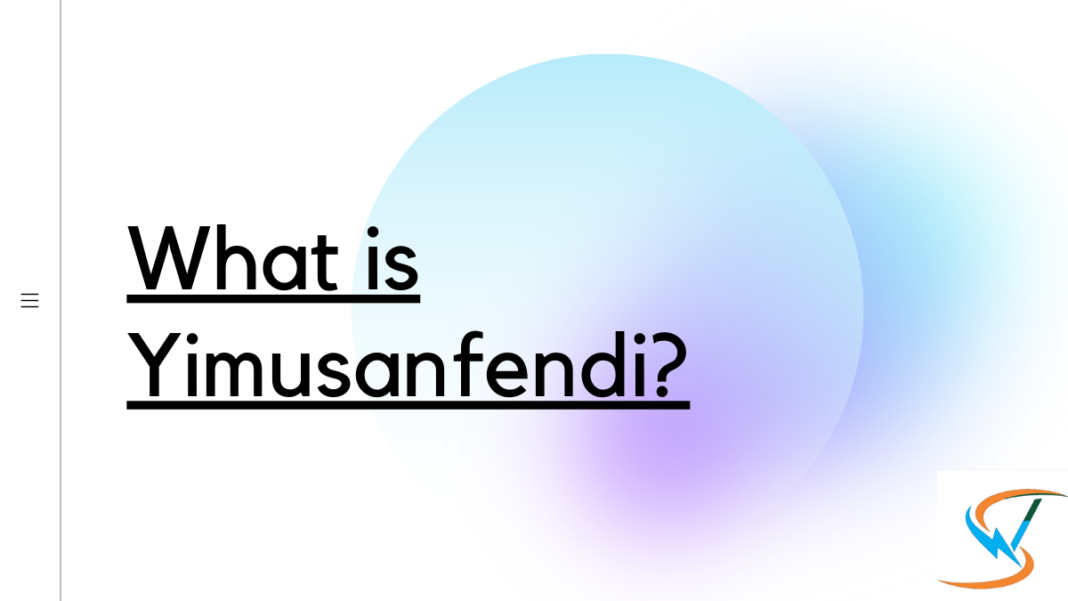In recent years, a term called “Yimusanfendi” has gained popularity, leaving many people curious about its origin, meaning, and significance. The term has become a part of online culture, spreading across social media platforms, forums, and online communities. While it may initially seem mysterious, Yimusanfendi has a fascinating story behind its rise. In this article, we will delve into the origins, evolution, and impact of Yimusanfendi, exploring how it has become a prominent phenomenon in contemporary digital culture.
Yimusanfendi Origins and Definition
The term “Yimusanfendi” originated from a Chinese phrase composed of four characters: “一目三斤的帆帝” (yī mù sān jīn de fān dì). It can be roughly translated in Mandarin as “one look, three kilograms Emperor.” However, the characters’ meanings themselves hold no connection to the phrase’s contemporary interpretation. Instead, the term’s significance is derived from its use as a humorous and satirical online expression.

Evolution of Yimusanfendi
The term Yimusanfendi gained traction on Chinese social media platforms, such as Weibo and Bilibili, around 2019. Initially, it was used in online entertainment, particularly in video games, where it described an overpowered character or player. The phrase humorously suggested that a mere glance from such a character could cause opponents to lose three kilograms in weight (a playful exaggeration). It soon became a popular catchphrase among gaming communities, representing dominance and skill.
However, as Yimusanfendi continued to circulate on the internet, it began to transcend its gaming origins and took on a broader meaning. It became an internet meme that encapsulated the idea of possessing exceptional abilities or expertise in any field. It was often used ironically or humorously to exaggerate one’s own abilities or to poke fun at the perceived arrogance of others. The phrase also became associated with a sense of confidence and self-assuredness.
Spread and Popularity
The rise of Yimusanfendi was propelled by its spread through various online platforms. Memes, videos, and fan art featuring the term flooded social media timelines, making it difficult to ignore. The infectious nature of internet culture, coupled with the relatability of the term, contributed to its rapid dissemination. Soon, Yimusanfendi crossed language barriers and gained recognition beyond Chinese-speaking communities, garnering attention from international online users.
Influence of Yimusanfendi on Digital Culture
Yimusanfendi’s influence on digital culture cannot be overstated. Its widespread usage has led to the emergence of fan communities, creative works, and even merchandise related to the term. Memes featuring Yimusanfendi have become an integral part of online conversations, making their way into discussions about various topics, from sports to academic achievements.
Moreover, Yimusanfendi has seeped into everyday language, often used in casual conversations and social interactions. The phrase has become a way for individuals to express admiration for others’ skills or to ironically boost their own ego in a light-hearted manner. It has created a sense of belonging and camaraderie among online users, who understand the shared humor and references associated with the term.
Social Impact
The rise of Yimusanfendi is not just limited to entertainment and internet culture. It reflects the changing dynamics of communication and the power of memes to shape collective consciousness. Yimusanfendi has served as a tool for subverting traditional hierarchies and fostering a sense of empowerment among individuals. By embracing the phrase, users feel a sense of belonging to a community that values confidence, expertise, and humor.
Furthermore, Yimusanfendi has opened up avenues for creativity and self-expression. Artists and content creators have incorporated the term into their works, spawning fan art, animations, and even music videos. This collaborative and participatory aspect of Yimusanfendi showcases the potential of digital culture to bridge gaps and inspire new forms of artistic expression.
Conclusion
Yimusanfendi’s journey from a gaming term to a cultural phenomenon reflects the power of the internet and its ability to create and spread viral content. What started as a humorous expression among gamers quickly transformed into a symbol of expertise and confidence across various online communities. Yimusanfendi has become ingrained in digital culture, influencing language, creative works, and social interactions.
The story behind the rise of Yimusanfendi highlights the evolving nature of internet culture and its impact on society. As online communities continue to shape and redefine cultural norms, phrases like Yimusanfendi will serve as reminders of the dynamic and interconnected nature of the digital landscape.
FAQs about Yimusanfendi
What is Yimusanfendi?
Yimusanfendi is a term that gained popularity on Chinese social media platforms, notably Weibo and Bilibili, around 2019. While its exact origin is not clear, it became a trending topic and is often associated with a humorous and colloquial expression.
What does Yimusanfendi mean?
The literal translation of Yimusanfendi is “一目三分地” in Chinese, which can be loosely translated to “glancing and scoring three points.” It is often used to describe the ability to quickly assess or judge something with just a brief look.
How is Yimusanfendi used in social media?
Yimusanfendi is commonly used in a humorous context on social media. Users may employ the term when sharing funny anecdotes or making light-hearted observations about a situation, emphasizing the quick judgment or assessment of a particular scenario.
Is Yimusanfendi a slang term or part of internet culture?
Yes, Yimusanfendi can be considered a slang term that emerged as part of internet culture in China. It reflects the dynamic and ever-evolving nature of online expressions and language, particularly within the younger demographic.
Does Yimusanfendi have any cultural significance?
While Yimusanfendi may not have deep cultural significance, it does highlight the creativity and playfulness present in Chinese internet culture. It exemplifies how internet users can create and popularize new terms, contributing to the vibrant linguistic landscape of online communities.
Is Yimusanfendi used in everyday conversations?
Yimusanfendi is more commonly used in online conversations, particularly on social media platforms. While it may find its way into some informal spoken language, it is primarily associated with the digital realm.
Can Yimusanfendi be translated into other languages?
Translating Yimusanfendi directly may be challenging, as it is a colloquial term deeply rooted in Chinese language and culture. However, conveying its essence as a humorous expression for quick judgment can provide a suitable approximation in other languages.



